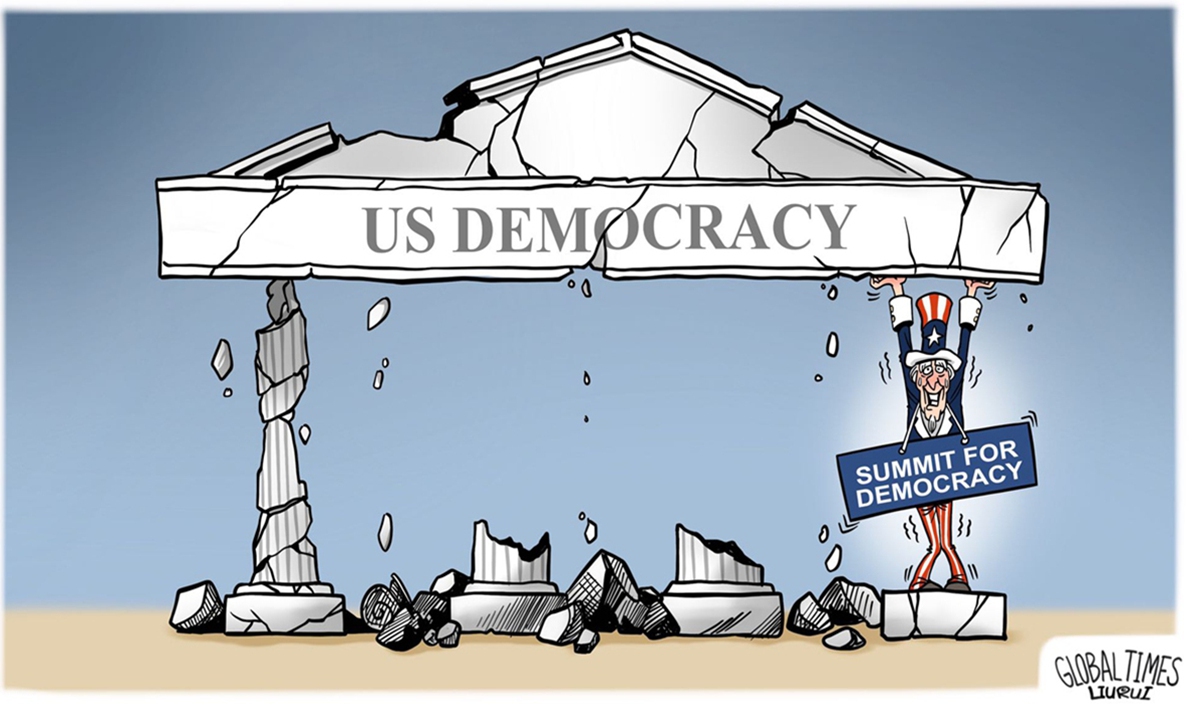
By Bradley Blankenship
US President Joe Biden will virtually convene in early December a summit for democracy, hoping to deliver on promises to show that liberal democracy works and stop democratic backsliding around the world. However, there's one huge problem: The US and its allies are disproportionately responsible for a lot of the world's erosion of liberal democracy, and there's data to back this up.
As was recently reported by the New York Times, new data from V-Dem makes clear that the US and its allies (countries with a formal or implied mutual defense commitment) have provided only 5 percent of worldwide increases in democracy in the 2010s while accounting for 36 percent of the decreases. This group of countries has actually seen democracy declines by nearly double the rate of its non-allies.
A number of factors explain the decrease, with the first being that US democracy is not actually desirable. According to a November 1 study from the Pew Research Center, only 17 percent of people in surveyed countries viewed US democracy as worth emulating, compared to 23 percent who said it was never a good example.
US democracy is completely dominated by capital, reflected in the fact that the country is a functional plutocracy (i.e. a government by, of and for the wealthy) and that preferential treatment is given to rich individuals and corporations.
For example, the US Supreme Court ruled in the infamous Citizens United v. Federal Election Commission case that political spending equals free speech, meaning the more money you have, the more speech you have. This has shattered already weak campaign finance regulations in the country, allowing the wealthy to essentially tip elections and buy political influence.
But even the political rights that do exist are under threat. Voting rights, especially for minorities, are under attack across America. A practice known as gerrymandering allows politicians to pick their voters instead of the other way around and a majority of Republican voters don't even believe election results can be trusted.
To be fair, a cursory glance at US history reveals that its democracy was never actually designed to be inclusive, considering the fact that the constitution was written by wealthy white bankers and slave-owners.
These anti-democratic guard rails are still seen in the fact, for example, that twice in the past two decades the president was elected by a minority of voters. This happened in 2000 when George W Bush with a minority of the popular vote beat Al Gore, who had a majority of votes, and again in 2016 when Donald Trump with a minority beat Hillary Clinton.
Another thing to note is that not only is America a bad example of democracy, its influence is actually actively eroding democracy. There are two points to consider here.
The first point goes back to one of the classic problems of democracy, which is that it's only as good as its polity is informed. However, the influence of American media, particularly through social media, is objectively making people less informed, fueling hatred and division and turbo-charging the kind of "illiberal democracy" that many in Washington fear.
For example, numerous reports suggest that Meta, the company that owns Facebook, uses algorithms that create hermetically sealed echo chambers - plus, by its own admission, the company lacks the proper staff to moderate content in international markets or in languages other than English.
Countries with loose regulations that allow unfettered access to American Big Tech companies are seeing growing political destabilization. As a counterpoint, China's responsible regulations on tech monopolies are clearly why it has managed to avoid many of the issues plaguing countries around the world.
The other area in which the US erodes democracy is its long-time support for dictatorships and the suppression of political rights in nearly every part of the world except for Europe (though, it should be noted, it did that at various points too).
As US global hegemony continues its inevitable decline, this is naturally leading to the expansion of political rights across the Global South. It means that US influence has been the thing actually holding back democracy for the majority of the global population.
When President Biden convenes his curated list of participants for the summit for democracy, it is highly anticipated that he will blame democratic backslides on growing influence from countries like Russia and China. But this would be a hard circle to square when the data makes clear that it's actually the US that is an inherently destabilizing force in the world.
The author is a Prague-based American journalist, columnist and political commentator.













